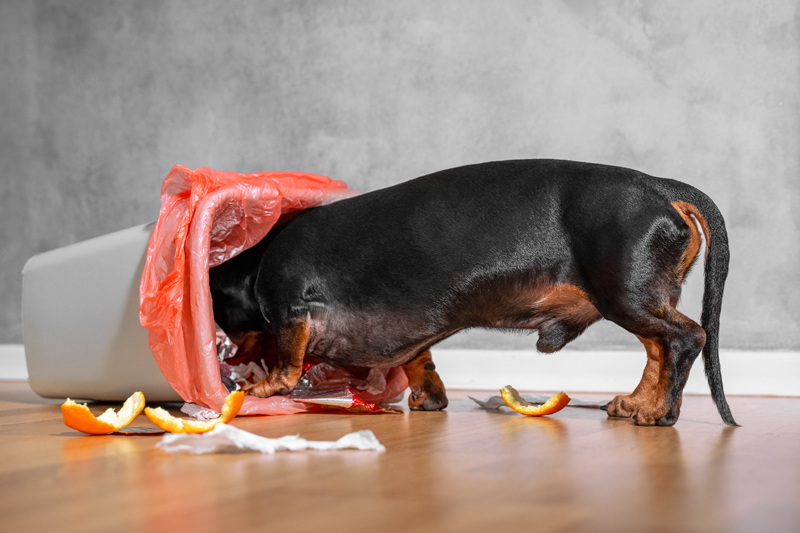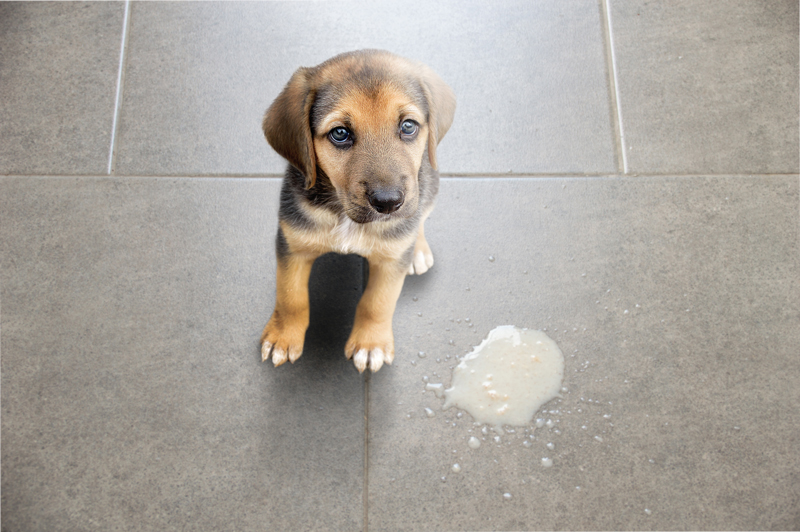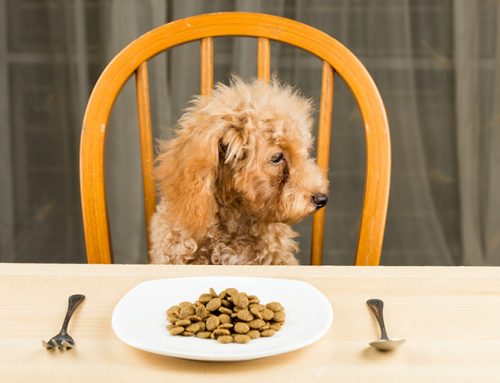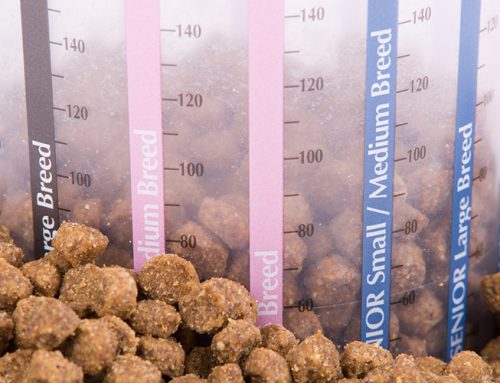Everybody pukes. Even dogs.
Most dog owners have been woken up to the sound of their dog throwing up and have had to clean up a pile of vomit while half asleep. It’s worse — so much worse — than when a dog throws up in the middle of the day.
“Occasionally, healthy dogs will get sick for no apparent reason and then continue with their day as if nothing happened,” an American Kennel Club article titled Dog Vomiting: Causes, Diagnosis and Treatment notes. “This type of vomiting is usually nothing to worry about.”
In most cases, the reason your dog has an upset stomach is because of something it ate. Dogs are tricksters when it comes to gobbling something off the sidewalk or getting into the trash. Highly-food motivated dogs usually find food — or something that used to be food — irresistible. And dogs are fast! It can be hard to get an unknown snack out of a dog’s mouth before they swallow it.
Sometimes dogs eat something that couldn’t be mistaken for food: a paper toilet roll, a tissue paper, foliage, socks, the carpet, a food wrapper, a wad of dirt — not all dogs have discerning palettes and eating things that aren’t food can cause an upset tummy. In more serious cases, eating non-digestible products can lead to intestinal blockages, which means a trip to the vet for an X-ray and removal.
Symptoms of intestinal blockages are:
repetitive vomiting
- diarrhea
- straining during bowel movements
- loss of appetite
- abdominal bloating and pain
- drooling, burping
- lethargy
- whining
If you think your dog has a bowel obstruction, contact your vet as soon as you can.
Symptoms of an upset stomach often include:
- loose stools or diarrhea
- vomiting
- excessive flatulence
- audible tummy gurgling
- eating grass
- dog ignoring its meal
- excessive water drinking
- lip licking, or air licking
- looking uncomfortable and stretching
burping
Let’s look at why your dog might have an upset stomach.
It ate rotting or contaminated food
(or something else it shouldn’t have)
In healthy dogs, this is the most likely culprit. Some dogs like to get into the trash or compost to find a snack. Your dog might have ingested something rotting, moldy or fetid and is paying the price. If you know your dog likes to forage for food, you may need to find ways of limiting its access to waste areas like compost piles.

Dogs also sometimes eat poop and dirt, which can cause an upset belly, especially if there were toxins or parasites in the waste.
If you take your dog hiking off leash, it may have eaten something like a mushroom, another animal’s feces, sticks, mud, or other plant life . It can be hard to keep track of what your dog has access to out in the wilderness, but if your dog is routinely coming home from hiking and getting sick, you may want to consider keeping it on a leash and see if you can monitor what it’s snacking on.
It may have been exposed to a bacteria or virus
This can happen anywhere — the world is full of bacteria and viruses and your dog spends a lot of time nosing around. If you live near a body of water that is also used by the local wildlife, your dog can pick up bacteria from swimming. Some possible bacterias your dog can pick up in water are: cyanobacteria, cryptosporidiosis, giardiasis, and pythiosis.
Your dog doesn’t even need to go in the lake: if it’s roughhousing with or licking another dog that had been in the water, yours might be able to pick up bacteria.
Many bacterias and viruses include upset digestive systems (vomiting, diarrhea) as symptoms.
Your dog may have picked up doggie illness
According to the American Veterinary Medical Association (AVMA), dogs can get canine influenza, which is a newer illness spread through respiratory secretions and contaminated surfaces, bowls, collars and leashes. Symptoms are similar to that of kennel cough: cough, fever, and snotty nose.
To avoid other serious and contagious illnesses like canine distemper (symptoms include runny eyes, vomiting, fever, coughing, diarrhea and more) and canine parvovirus, keep your dog’s vaccinations up to date. Parvo and distemper are considered core vaccines and most dogs are given vaccinations as puppies. These vaccinations need to be periodically updated.
If your dog is a rescue and you don’t know it’s history, your vet may be able to do a blood test to see if the vaccines are still in its system.

Dogs can also get fungal infections that lead to vomiting and digestive issues.
“In general, the fungus infects the body through the respiratory tract and causes fever, coughing, lethargy and flu-like or pneumonia-like signs,” according to the AVMA. “If eaten, digestive problems (e.g. pain, diarrhea) can occur.”
The AVMA breaks down what fungal organisms are more prevalent across the United States: “Histoplasmosis is more common in the Eastern and Central U.S.; blastomycosis is more common in the Southeast, Southcentral and Midwest regions; cryptococcosis is more common in the Pacific Northwest region; and coccidioidomycosis is more common in the Southwest U.S.”
Leptospirosis is caused by the Leptospira bacteria, which is found in contaminated water, food or soil. This also can cause vomiting, fever, abdominal pain and kidney or liver fever, but a vaccine is available.
There are other illnesses that cause vomiting and digestive issues. Talk with your vet if your dog’s upset digestive system doesn’t appear to be caused by food in order to treat any underlying conditions.
Sometimes, new medications can also cause your dog’s tummy to get upset. If you’ve recently added a medication, your dog could be reacting to it.
Your dog has food allergies
Food allergies make up about 10 percent of dog allergy cases. Dogs can also experience food intolerance, which isn’t quite the same thing but can have similar signs.
“Many owners assume that a dog with a chronically upset stomach has food allergies, but many dogs who have chronic upset tummies may have a food intolerance; if there is no hypersensitive immune response, it’s not an allergy,” according to Whole Dog Journal.
Pets aren’t born with food allergies. Allergies can develop over time and repetition. Your dog may happily eat lamb for years and then get symptoms. Genetics can also play a role; some breeds may be more prone to allergies.
Gastrointestinal problems (chronic flatulence and diarrhea) can be a sign of a food allergy or sensitivity. The most common dog food allergens are beef, dairy, wheat, egg, chicken, lamb, soy, pork, rabbit and fish, according to Fetch by WebMD. Preservatives and dyes in dog food can also cause sensitivities.
To determine if your dog has a food allergy or sensitivity, you can try an elimination diet. This involves limiting your dog to one protein (preferably one it hasn’t eaten before) and one carbohydrate for weeks to see if this results in an improvement.
If your dog’s symptoms improve, you can start adding new proteins and carbs one at a time. If your dog’s symptoms get worse, you’ll need to restart the elimination diet with a new protein/carb combo. Keep treats to a minimum.
You may need to do an elimination diet for eight to 12 weeks, depending on how your dog does.
Food allergies, like serious medical conditions, come with more than one symptom. An upset stomach won’t be the only thing your dog is experiencing.
If you suspect a food allergy, also look for:
- Excessive itching
- Unhealthy/lustreless skin/coat
- Chronic ear or foot infections
- Excessive yeasty/corn chip smell
- Dark red paws (look between the toe pads)
- Hives
- Facial swelling
- Sneezing
- Runny nose and eyes
Constant licking
- Itchy rear end
- Hair loss
- Skin lesions
Your dog may have eaten something toxic
A plant that seems harmless or ornamental may be toxic to your dog. The ASPCA provides a long list of plants toxic to dogs on its website. It includes flowering plants, herbs and ornamental household plants. When in doubt, keep your garden fenced off from your dog, especially if your dog is prone to munching leafy greens.
Other possible toxins are herbicides and pesticides so stay off recently fertilized lawns. Your dog might not eat grass, but he or she may lick her feet and ingest toxins that way later on.
The ASPCA also has a list of poisonous household products. There are things it’s obvious to prevent your pet from ingesting: bleach, grout and fabric softener sheets. Eating these things will lead to an upset stomach and fabric sheets can also lead to intestinal blockages. If your dog eats petroleum jelly, baby aspirin and bar soap you may be cleaning up vomit. It’s best to keep medications and beauty products out of reach or your dog’s curious mouth because many products can cause an upset stomach — as well as more serious health issues — if ingested.
Sorbitol can also cause loose stools and diarrhea.
A chronic upset stomach can be a symptom of a serious illness
While an upset stomach can be a symptom of a serious illness, it is unlikely that it’s the only symptom. Pay close attention to your dog to assess what else they may be experiencing. Chronic vomiting, continuous vomiting, vomiting blood, bloody diarrhea or vomiting with other symptoms (fever, weight loss etc.) are indications something serious is going on.

Potential serious illnesses with vomit as a symptom include:
- Infectious diseases
- Inflammatory bowel diseases
- Metabolic disease: kidney or liver failure
- Parasites
- Pancreatitis
- Ulcers
- Cancer
- Heat stroke
- Medical reaction
- Bloat
- Vomit with blood in it
- Severe, acute vomiting
- Blood in stool
- Weakness and lethargy
- Standing with a drooping head
- Excessive drool
How do I help my dog’s stomach?
- Provide simple, easy to digest foods like oatmeal, cooked chicken, canned pumpkin, cooked rice or cooked sweet potato to see if those soothe your dog’s tummy, at least temporarily.
- Mix a prebiotic and probiotic into your dog’s food — it’s possible the bacteria in its stomach are out of balance.
- Let your dog eat grass if it wants to. It may cause your dog to throw up whatever it ate that upset the stomach. If your dog has a chronic sensitive tummy, there might be an underlying cause that grass can’t solve.
- Hold off on feeding your dog for 12 to 24 hours to see if symptoms improve with a break from food.
If your dog continues to experience an upset stomach, book an appointment with its vet to rule out illnesses or poisons.
Prevention can help prevent your dog from getting an upset stomach in the first place.
- Keep your dog leashed in new or unfamiliar terrain, especially if your dog is prone to eating things off the ground.
- Don’t let your dog swim in still lakes, or lakes with surface algae.
- Don’t let your dog drink from unknown water sources or communal bowls.
- Keep your dog away from household plants, cleaners or beauty products.
- Keep garbage cans and compost buckets out of reach.
- Don’t let your dog drink from the toilet.
- Keep your dog’s blood work and vaccinations up to date.






